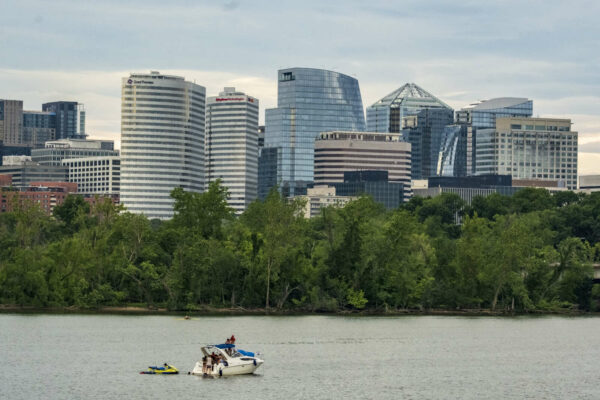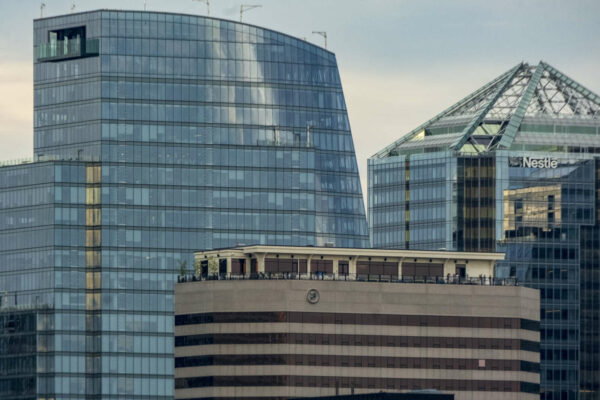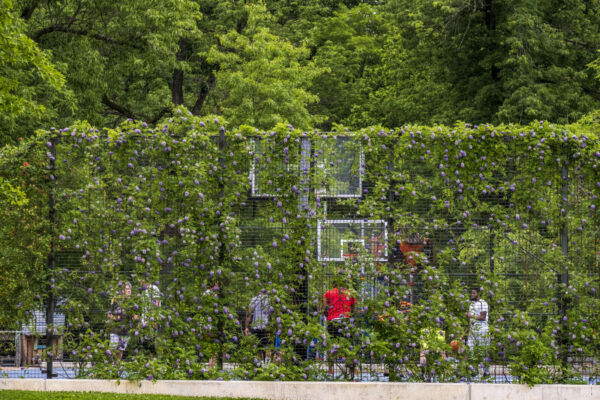A partnership between an apartment owner and a coworking provider has brought the office environment to an apartment complex in Arlington’s Long Branch Creek neighborhood.
Second Space Work Suites has set up shop at 2400 26th Road S., in the Avalon at Arlington Square community.
Ballston-based AvalonBay Communities partnered with Industrious to create the hybrid work environment. The two organizations conducted a soft opening of the Arlington location in February and have been accepting lease applications since then.
The spaces are being described as an “alternative workplace” that allows people to live and work in the same neighborhood. In some cases, the workspaces are offices away from an employee’s main office.
“Workers do not want to commute daily to the office and they don’t want to spend all of their time in their homes either,” said Evan Fain, the general manager of New Ventures and Strategic Partnerships at Industrious, in a press release. “With AvalonBay we have created a new category of workplace that gives workers a choice to be closer to home but with all the conveniences and community they’d expect from an office.”
The spaces are in response to a “hybrid work trend in local markets outside of major metropolitan areas where traditional offices are placed,” the press release notes. The suites give residents “the convenience of a workspace close to home – a key part of most hybrid work schedules – with easy access to local businesses, including child care centers, food and beverage options and more.”
The offices feature amenities that include an in-suite kitchenette, fully furnished shared spaces, and access to public transportation.
The Arlington location is the first in Virginia for the growing Second Space Work Suites network, which has other locations in California and New Jersey.
“Workers are increasingly prioritizing choice to create flexible schedules and avoid long commutes,” said David Madrid, the Vice President of Innovation and Venture at AvalonBay. “In response, we remain dedicated to meeting this changing demand by offering a high-quality experience tailored to remote workers… We hope remote and hybrid workers find a distraction-free environment that supports day-to-day needs and long-term professional goals.”
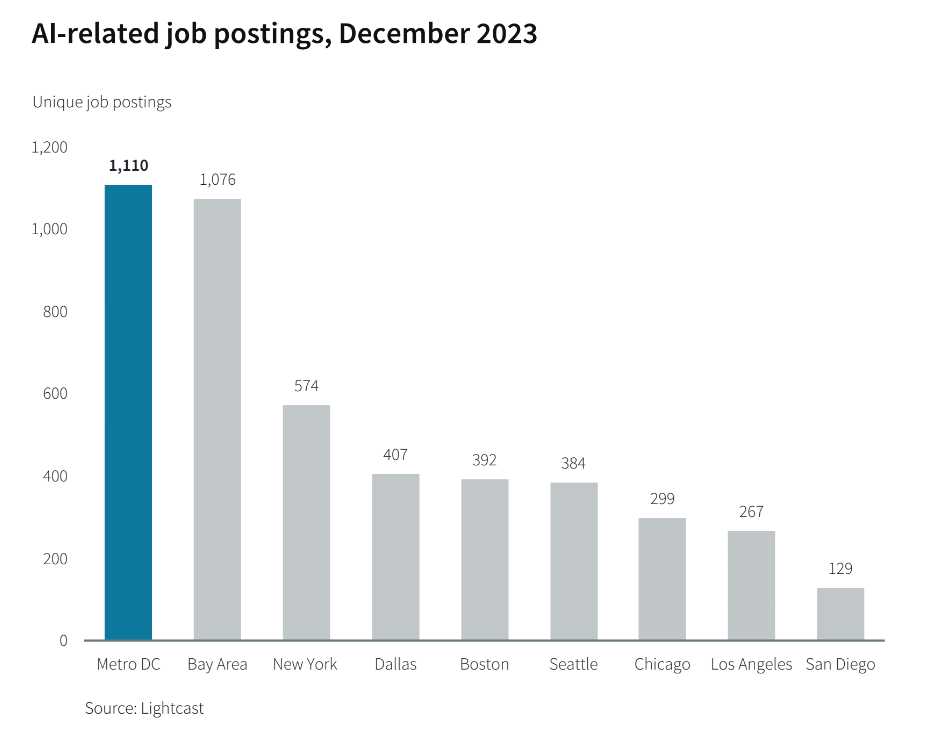
The D.C. area has surpassed the Bay Area in AI-related job postings, according to a recent report.
These new jobs are a clear sign of how the emerging technology is already impacting Arlington and its neighbors, per a Tuesday report by the real estate company JLL.
The report predicts the region’s numerous data centers will have to undergo AI-focused upgrades to meet industry requirements and notes there is already a surge in AI lobbying in response to potential regulations.
“While the Bay Area has long been known as a hotbed for AI product development, tech companies are navigating economic uncertainties by scaling back on their workforce,” the report says. It says the D.C. metro area had 1,110 AI-related postings as of December, a notch above 1,076 in the Bay.
“Meanwhile, Metro DC’s tech ecosystem is less susceptible to market fluctuations, stabilized by federal spending and government contracts,” JLL wrote.
Of these jobs, only 155 list Arlington as their location, however, JLL Researcher Kate Paine chalks this up to its proximity to D.C. She tells ARLnow that many Arlington employers recruit from out of state and often list the location as “Washington, D.C.”
“There is nuance in the data and the way jobs are posted that might not accurately reflect the reality,” Paine said.
Farther out, there are more AI-related job postings, or 437, in Fairfax County and the city of Fairfax.
The report says the D.C. area has several industries driving demand for AI specialists, including defense, health care and finance — sectors that are well-represented in Arlington’s startup scene.
While the D.C. area and the Bay are in close competition, New York City, the region with the next-highest AI labor demand, comes in a distant third with 574 job postings.
Beyond creating jobs, AI is expected to impact the region’s data centers. Northern Virginia has more data centers than anywhere else in the world and — while last year saw a surge in data center leasing — JLL says these centers still need to adapt to meet AI-specific requirements, including higher power consumption.
“As the largest data center market in the world by a magnitude of 3x, Northern Virginia will be at the international epicenter of the AI-fueled demand curve in the near-term and long-term,” the JLL report says.

AI lobbying is also on the rise as lawmakers — including Arlington’s Rep. Don Beyer — try to pass a slew of laws regulating the industry. The number of entities seeking to influence AI policy ballooned in 2023 — from 129 in the first quarter of that year to 335 in the second quarter, according to JLL.
“The future of AI will undoubtedly hinge on the regulatory environment, which is unknown territory currently,” the report says. “Further complicating the legal landscape [are] the numerous copyright disputes making their way through the judicial system. As a result, lobbying firms are racing to represent the industry.”
Companies, nonprofits, universities, trade groups and other organizations reported spending $569 million in federal AI lobbying during the first three quarters of last year, the report estimates.
The region’s place as a lead location for people with AI backgrounds has been several years in the making. In the last five years, AI-related job postings in the D.C. area have more than tripled, JLL found in a fall 2023 report.
While recent years have seen companies such as Amazon establish major presences in Arlington, the fall report noted that the Pentagon is also investing huge amounts of money into AI.
The Department of Defense requested $1.8 billion in its 2024 budget for capabilities, workforce development and data management efforts related to the rapidly developing technology. And that’s not to mention demand from the intelligence community.
JLL found that nearly half of all AI-related positions in the D.C. area required clearance for top secret or sensitive compartmented information, as of last fall.
Only 15% of AI job postings in the region were remote — potentially good news for places like Arlington, which is adapting to an economic landscape in which many remote workers have been leaving for places with lower costs of living.

An intensifying climate and ongoing impacts of the shift to remote work will transform Arlington over the next 25 years, experts say.
At the same time, the county’s workforce will need to become more nimble to keep up with changes driven by artificial intelligence.
Speakers made these predictions on Monday during a panel that kicked off a year-long discussion of what Arlington should look like two-and-a-half decades from now, called the Arlington 2050 Initiative.
Arlington County Board Chair Libby Garvey, who moderated the event, said the county will use community input to produce two or three visions to guide later decisions.
“For now, we’re just trying to get as many views as we can, as possible, to begin to form those alternate visions of what our future should be,” Garvey said.
At the end of the evening, a crowd of about 150 attendees filled out postcards imagining that they were describing Arlington in the year 2050. Common themes included more green spaces, expanded public transit and the erasure of racial and economic disparities.
“Diverse thought and opinions are prioritized in order to make Arlington a place where people can live comfortably, and at times during difficult conversations, uncomfortably, in order to progress our county,” said a 16-year-old representative from the Teen Network Board, reading aloud from a postcard.
The climate in 2050
In terms of the climate, Arlington’s 2050 forecast calls for hotter summers and more intense precipitation.
In the 1800s, Arlington used to experience about 20 days each summer above 90 degrees, said panelist Jason Samenow, a meteorologist and weather journalist at the Washington Post. These days, it’s more like 40.
Between 2041 and 2070, Arlington is expected to average 65 days each year above 90 degrees — and that’s based on an optimistic model. More aggressive scenarios, he said, call for even more serious impacts.
“It just means more suffering, especially for vulnerable populations, for people who are poor, the homeless,” Samenow said. “On hot summer nights, they can’t cool off. That increases heat-related illness, heat-related mortality.”
A warming climate disparately impacts urban areas such as Arlington, which tend to have lots of concrete and asphalt, he said. These surfaces absorb heat and radiate it back into the environment, making them hotter than more rural areas. The county can combat these effects by planting more trees and investing in surfaces that reflect heat instead of absorbing it.
In addition to heatwaves, heavy rainstorms are expected to take a toll and the meteorologist warned of more flash flooding such as the severe floods Arlington saw in 2019.
He urged the county to find ways to reroute traffic and redirect floodwaters during torrential rain.
“I think we have to start thinking real mitigation, from the perspective of how an engineer sees mitigation,” Samenow said. “That means redesigning how we live, redesigning how we work, redesigning how we play.”
Adapting to remote work
Another challenge that Arlington faces is people leaving.
Even before the pandemic, many young urban professionals across the country were seeking less expensive places to live, said Hamilton Lombard, a demographer at the University of Virginia Weldon Cooper Center for Public Service. Arlington was not immune from this trend, exacerbated by the shift to remote work, the consequences of which are still playing out.
Remote workers continue to leave Arlington en masse, Lombard said, noting that last year, people moved out of Arlington “on a scale comparable with 2020 and 2021.”
If many workers can live anywhere, the county needs to figure out why people should choose to remain here.
“There’s a lot of rural counties in Virginia that are very happy to compete with Arlington,” the demographer said. “I think five years ago, people would have laughed at that idea. But they’re not. They’re very serious about it now.”
As Arlington continues to seek solutions to the effects of remote work, Lombard said the county should consider just how much it has adapted and changed at other points in recent history, such as its “smart growth” along Metro corridors.
“Arlington has shown in the past that it has the capacity to make some serious adaptations and changes,” he said. “It did this with Metro. I think in the next couple decades, [Arlington is] going to have to make changes on a scale that has been successful in the past.”
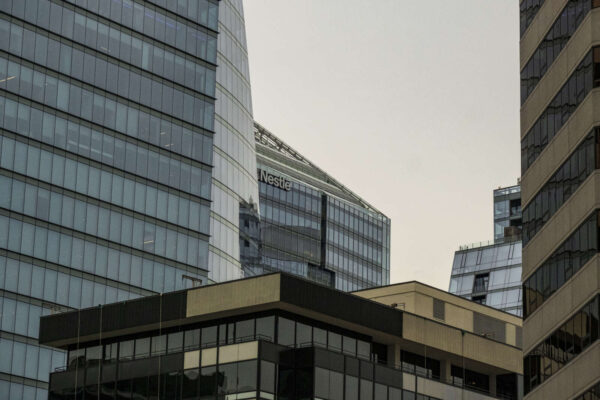
(Updated 11:20 a.m.) Arlington has the second highest work-from-home rates in the nation, U.S. Census Bureau data from 2021 show.
The county falls just behind Fremont, a city in California’s Silicon Valley that is home to numerous tech companies, while D.C. ranks third. And within the metro D.C. area, the remote work population in northern Arlington specifically is second in size only to the central and downtown parts of the District.
People who study these trends, like Economic Innovation Group economists Adam Ozimek and Eric Carlson, say Arlington’s high ranking does not surprise them. They analyzed data on remote work for ARLnow, comparing the 46 commuting zones that make up the D.C. area.
At 55%, “North Arlington has one of the highest work-from-home rates in the D.C. region,” said EIG Chief Economist Ozimek. “Even South Arlington does pretty well in terms of the region overall, 43% is high overall, even though the income divide you can see.”
Looking at five-year population estimates, they found that the D.C. area as a whole topped the charts with a 34% telework share overall, followed by San Francisco (33%) and Austin (32%). San Jose and Seattle came in fourth and fifth, and much larger cities, including Chicago and New York City, ranked 18th and 20th with teleworkers comprising around 23% of the workforce.
“The D.C. area is just about as work-from-home as we would expect based on underlying factors,” Ozimek said. “Higher-educated places have more work from home. More expensive places have higher rates of working from home. And occupation matters: you’ve got a lot of skilled workers in general. The more skill, the more likely it is to be remote.”
Arlington, he said, has some of the highest average home values and education levels in the region. In addition, nearly half of jobs in the D.C. area can be done remotely, compared to other parts of the country, like Las Vegas and Grand Rapids, Michigan, where 30% or fewer jobs can be done remotely, they found.
While the pandemic precipitated this pivot to remote work, working from home — at least a few days a week — appears to be settling in as a permanent fixture of how many Arlingtonians get their jobs done.
And that is impacting Arlington County’s record-high office vacancy rate, which reached 20.8% during the second quarter of 2022. The county generates 45% of its property tax revenue from taxes on commercial properties like office building, helping to fund Arlington schools and county services while taking some of the pressure off of homeowners.
The office vacancy rate is higher now — with masks no longer required and vaccines and boosters readily available — than it when the pandemic first took hold (16.6%) and at the beginning of 2021 (18.7%).
“The challenges are really deep,” County Manager Mark Schwartz told the County Board last week. “Long-term leases are becoming rarer. To ask people who used to come to the office five days a week to do so again… might not be met with universal acclaim from those who used to drive into the office five days a week.”

Nearly half of remote and hybrid government workers say their team performance has improved during the course of the pandemic.
That’s according to new research from Crystal City-based consulting firm Eagle Hill Consulting.
From a press release:
Forty-six percent of government employees who telework – both fully remote and hybrid employees – say their team’s performance improved during the past two years. Only 35 percent of in-person government workers say their team’s performance has improved during the period, according to new research from Eagle Hill Consulting.
And as the trend for remote work continues among both federal and state and local governments, more than half of the government workforce reports teleworking, either in a fully remote (26 percent) or hybrid environment (24 percent). A substantially higher number of younger workers in government report working fully remotely (34 percent) as compared to mid-career (24 percent) and older workers (11 percent). Those working in-person are far more likely to be older workers (70 percent).
Findings like this may lend further credence to the idea that hybrid and fully-remote work environments are not just a pandemic blip and are here to say, which will present significant challenges for both office building owners and local governments, including here in Arlington.
Today, we wanted to pose the performance question to readers, as well.
Are you working remotely, either on a full-time or hybrid basis? And, if so, do you think remote work has improved or hurt your team’s overall productivity?
The pandemic has moved office work to the home. As at least some of that work moves back to office buildings, the next frontier might be outdoors.
In Arlington, a recently-renovated 1980s office building in Courthouse offers a glimpse of a greener office future, with a year-round outdoor working space.
The new 16,000-square foot landscaped outdoor plaza at 2000 15th Street N. — the centerpiece of a $11 million renovation project — is the largest outdoor plaza of any office building in the Rosslyn-Ballston corridor, according to American Real Estate Partners (AREP).
“The renovated plaza, wired for connectivity, extends the office to the outdoors, offering all-season, year-round use as a work and meeting space, and provides a spectacular backdrop to the indoor conference and amenity spaces, creating an urban oasis,” said Paul Schulman, AREP’s Principal and Chief Operating Officer.
The group says the renovation will help tenants coax employees back to the office with new experiences and stronger health features, such as air filters and purifiers. Experts say such projects are the latest examples of how incorporating natural elements into built environments can improve employees’ health while promoting environmental stewardship.
COVID-19 has altered many people’s work and personal habits, and these changes are likely to stick around, according to a Post-Schar poll released this summer. Three-quarters of respondents said they’ll spend more time outside, two-thirds said they’d wear comfortable clothing more often, and nearly 70% said they’d wear a mask when sick.
People and offices are adapting to these behavioral changes, in part, by working outdoors — or by bringing elements of the outdoors inside — and focusing on wellness measures.
During the pandemic, experimental outdoor work spaces popped up in Crystal City and in Rosslyn’s Gateway Park.
Meanwhile, new office projects here boast natural elements — such as Amazon HQ2’s water- and mountain-inspired “Helix” building — and wellness, such as Skanska’s new office project near Quincy Park, which has been recognized for its focus on health and well-being.
The seeds for natural, “biophilic” design elements were planted decades ago, says Dr. Gregory Unruh, an expert on sustainable business strategy in George Mason University’s School of Integrative Studies. It took a pandemic and the right technology to get people to rethink their work environments and to see nature integrated into offices.
“There’s something about us having a connection with the world,” he said. “Before the conversation around ‘biophilia’ existed, there was scientific research that suggested if you give people windows with a view of nature, they tend to be more productive, happier and less sick.”
Other research demonstrated that, without outdoor air circulating in and with the synthetic materials in carpets, paints and cleaning supplies, indoor office spaces had poorer air quality than the outdoors, despite the gas-burning cars and other pollution sources outside.
COVID-19 connected these issues, Unruh says. Building owners outfitted indoor spaces with machines that regularly bring outdoor air inside while people spent more time outdoors.
Although employees and employers realized that remote work could be as productive as in-person work, they still recognized the need for interpersonal collaboration — a need he says the rise of outdoor working spaces will meet.
“These collaborative outdoor spaces are going to play a role,” Unruh said. “These initial experiments we see in Arlington are very encouraging, and I think they enhance the working life and community life of people.”
Integrating nature into workplaces could encourage environmental stewardship among more people, says Elenor Hodges, the Executive Director of EcoAction Arlington.
The biophilic elements at 2000 15th Street N. and other under-construction projects support the environment in addition to workers, she says. Additional trees improve stormwater management and green roofs keep the county cooler.
Particularly in urban areas, she said, strengthening one’s connection to nature is important for encouraging sustainable habits.
“People need to see nature in order to understand the importance of stewarding it,” she said.
She notes that the county-level conversations about biophilic design, still in their infancy, are pandemic-driven.
“We’ve seen at County Board meeting people raising these questions [about biophilia],” she said. “I don’t think that would have happened before the pandemic.”
Fallen Pentagon Officer Remembered — “George Gonzalez was a proud New Yorker, ever loyal to his home turf of Brooklyn and the New York Yankees. He was also a proud Army veteran, having served a ferocious tour at the height of the Iraq War, always mindful of his comrades who didn’t come home. And he was a proud police officer, like his older brother, having served as an airport security agent, a federal jail guard and finally a Pentagon police officer.” [Washington Post]
DCA Passenger Traffic Still Down — “The airport’s passenger count in July was down 35.2 percent from the same month in 2019… The biggest challenge facing Reagan National will be an ongoing dearth of business travel. While some airline executives are expecting to see some rebound this fall, the U.S. Travel Association predicts that business-travel spending will not be back to pre-pandemic levels until 2024.” [Sun Gazette]
VHC’s New Lobby Piano Debuts — “We were honored to host Arlington resident, Andrea as our first volunteer to play the Steinway B Grand Piano featured in our newly refurbished lobby. The piano was recently gifted to Virginia Hospital Center by Sid and Reva Dewberry, longtime Arlington residents and VHC donors.” [Twitter]
Local Workers Want Telework to Continue — “Nearly half (48 percent) of area workers have teleworked in the past month, according to the Washington Post-Schar School of Policy and Government at George Mason University poll, and more than half want to continue to telework at least some of the time. With a larger population working remotely, fewer people and less money would come to dense commercial areas that rely on a steady stream of people.” [Washington Post]
Flickr pool photo by John Sonderman
Yorktown Grad Sets Record at Olympic Trials — “18-Year-Old Arlington Aquatic Club swimmer Torri Huske just exploded in the first heat of women’s 100 fly semifinals, breaking the American Record. After showing off her speed this morning, splitting under World Record pace on the first 50, Huske blasted a 55.78 to touch first tonight. The swim marks a personal best by nearly a full second, and makes Huske just the 2nd American of all-time to break 56 seconds in the event.” [SwimSwam, Twitter, Twitter]
Amazon Adopts Hybrid Office Schedule — “We’ve adjusted our guidance on our plans for returning to the office and added more clarity. Going forward, we’ve decided to offer Amazonians a mix of working between the office and home… Our new baseline will be three days a week in the office (with the specific days being determined by your leadership team), leaving you flexibility to work remotely up to two days a week.” [Amazon]
Arlington Man Imprisoned for Harassment — “For more than a decade, the employees of a Washington think tank were traumatized by an unlikely harasser: a career Foreign Service officer. In hundreds of emails and voicemails, he called them ‘Arab American terrorist murderers’ and ranted about how they should be cleansed. Yet there was almost nothing they could do.” [Washingtonian]
Marymount Gets Federal Grant — “Marymount University has established a new fellowship program to prepare Clinical Mental Health Counseling graduates to serve high-needs populations and meet the demands of a growing profession. A $1.2 million grant from the U.S. Health Resources and Services Administration (HRSA) will fund 84 fellowships for students within the University’s School of Counseling.” [Press Release]
Reflections on Halls Hill History — “One of those local historians is Wilma Jones, who grew up in the mostly Black community of Halls Hill in Arlington, Virginia. Now the neighborhood is rapidly gentrifying and Black families like hers have been pushed out. Today, Jones says it’s too late to save Grandma’s house, but it’s not too late to save her history.” [With Good Reason]
Vote: Favorite Outdoor Dining Spot — There’s one day left in the voting for this week’s Arlies category: Favorite Outdoor Dining Spot. [ARLnow]
(Updated at 8:40 a.m.) Some federal agencies are looking to continue remote and hybrid working options for employees post-pandemic — a shift with potential impacts on Arlington’s office and residential real estate markets.
The Biden administration expects White House staff to return for full-time, in-person work in July, but on Thursday federal agencies were told that they will be able to offer increased work-from-home flexibility, even after the pandemic. Remote work may become a permanent option for some federal workers, just as is happening for many private-sector workers.
“I think the office market will cool as companies continue to assess what the remote work shift means for their workforce and space needs in the next few years,” said Eric Maribojoc, the executive director of the Center for Real Estate Entrepreneurship at George Mason University.
Arlington has a sizable federal presence despite the Base Realignment and Closure Act, which saw the relocation of military-occupied office space. The experience taught the county some lessons about diversifying its economic base, meaning Arlington today, preparing for more telework, is in a different boat than in 2005 facing BRAC.
Those familiar with the county’s market trends say there will be impacts but they will likely be tempered by a more diverse economy, a trend toward hybrid options that involve some time in offices, and a continued need for in-person work among certain agencies and large tech companies.
“Many companies are just beginning to plan for their potential return to the office and discussing a fully remote future is still largely speculative,” Arlington Economic Development spokeswoman Kirby Clark said. “We anticipate companies will continue to offer telework flexibility during this next stage of recovery. However, we hear from many of our major employers that there is no substitute for in-person collaboration in the office, especially for knowledge-based science and technology industries.”
Arlington’s federal workforce
Although it took a while, Arlington did experience a significant drop in federally-occupied office space.
From 2003 to April 2021, Arlington’s federal office space dropped from 11.4 million square feet to 6.3 million square feet, according to an AED report and the GSA.gov Lease Inventory.
Today Arlington has 29,200 federal employees — excluding military personnel — and is home to the offices of a number of agencies, including the State Department, U.S. Marshals Service, the Environmental Protection Agency and the Drug Enforcement Agency, Clark said.
Some former government tenants have been replaced with corporate, tech and research anchors and a lot more housing, however. Between 2016 and 2020, Arlington added 5,193 housing units, with 3,175 units under construction and 5,907 units planned for future construction, she said.
“Over the last ten years, the landscape of Arlington’s Urban Villages transformed, becoming more economically diverse and land-use balanced, with residential development replacing old, obsolete office spaces formerly occupied by federal tenants,” said Clark.
As a region, D.C. has the nation’s second-largest pool of potential remote workers, at 49%, behind the San Francisco Bay Area, at 50%, according to a February report from the Greater Washington Partnership. The northern half of Arlington has one of the highest concentrations of remote-capable workers, alongside portions of Northwest D.C. and the Bethesda and Potomac areas of Montgomery County.
The report, which came out before the news of the changing federal work-from-home guidelines was first reported, predicted that some of the largest gains in remote work post-pandemic will likely be among government jobs.
“Two in five federal government workers may spend some time at home, with smaller shares of state and local public-sector professionals working remotely,” the report said.
Among government employees, according to Clark and Maribojoc, these options will likely be expanded for those who perform individual tasks that require focus but not high levels of security clearance.
“Due to the presence of the Pentagon and other defense and security agencies in Arlington, many federal-supporting tenants have security requirements that may require physical office spaces or proximity to major government and defense anchors,” Clark noted.
If more federal government employees go fully remote — a conversation that Clark said is still largely speculative — she predicted that it would be “a challenge not limited to Arlington and has the potential for broader regional impacts in the future.”
Cherry Trees Planted in Pentagon City — “We are so excited to be celebrating with @CherryBlossFest and @amazon the planting of 12 Japanese Cherry Trees in #NationalLanding! Thank you for these beautiful new additions to the area!” [Twitter]
Renderings of Possible DCA Bridge — “JBG Smith Properties isn’t waiting to envision the future. In a video released to investors this month, the company showed off some 3D renderings of what a pedestrian bridge could look like, complete with some features that have not yet been showcased publicly for the project. There’s a small set of amphitheater-like steps for lounging on the bridge, for instance, plus some futuristic-looking coverings for people walking along the structure. There even appear to be bike lanes and greenery pictured at points along the bridge.” [Washington Business Journal, Vimeo]
Arrests in Malicious Wounding Case — “Officers located the vehicle the suspects were traveling in and conducted a traffic stop at the intersection of eastbound Route 50 and N. Courthouse Road… Inside the vehicle, officers recovered three loaded firearms including a black handgun with extended magazine, AR-15 style rifle and a shotgun.” [ACPD]
County 911 Center Administrator Honored — “The Virginia Association of Public Safety Communications Officials (VA APCO) has honored Arlington’s Emergency Communications Center (ECC) Deputy Administrator Jeffrey Horwitz with its Public-Safety Communications Information Technologist of the Year award.” [Arlington County]
Feds May Permanently Expand Telework — “As the Biden administration contemplates how to return the massive federal workforce to the office, government officials are moving to make a pandemic experiment permanent by allowing more employees than ever to work from home — a sweeping cultural change that would have been unthinkable a year ago.” [Washington Post, Washingtonian]
Virtual Chamber Ensemble Performance — “The National Chamber Ensemble will present a virtual performance of Vivaldi’s masterpiece The Four Seasons on May 29, 2021. The 2020-21 NCE season has been keeping the audience and artists safe as well as connected. Each concert is paired with a live virtual event/conversation with the artists. Taped May 22, the concert links will go out on May 29.” [Event Calendar]
Arts Group Pushing for New Venue — “As part of its recently adopted strategic plan, [Embracing Arlington Arts] plans to use the coming three years to build community support for a performing-arts venue that would include a black-box theater and ancillary classroom and office space. Efforts would also be made to identify a site and start raising funds.” [InsideNova]
APS Changing Student Camera Policy — “In response to challenges teachers are experiencing engaging students with cameras off, we have adapted our policy regarding the use of cameras during instruction time, based on input we have received from teachers, staff, parents, the Distance Learning Task Force, and advisory committee members. We are asking teachers to encourage students to turn on their cameras during synchronous instruction and while directly engaging with peers and staff.” [Arlington Public Schools]
Spotlight on Arlington Man’s Heroism — “A must read about Arlington’s Paris Davis, the former publisher of VA’s Metro Herald. His heroism in 1965, while commanding a Special Forces team in Vietnam, seems worthy of the Medal of Honor. But those who served with him say the Pentagon kept losing the paperwork.” [New York Times, Twitter]
Local Nonprofit’s Work Highlighted — “Mohammad Ahmed, 30, gave up working as an Uber driver in March for fear of infecting his wife, 3-year-old son and two elderly parents who live with him. When he couldn’t pay the rent or electric bill for their two-bedroom apartment in Arlington, a local charity funded mainly by taxpayer dollars stepped in.” [Washington Post]
Metro Reducing Rail Service — “Metro this week began reducing Metrorail service during peak commuting hours because of low usage while saying it will boost Metrobus service as new commuting trends emerge during the coronavirus pandemic. The transit agency referred to the changes as a way to ‘normalize’ rail service.” [Washington Post]
Local Economy Expected to Grow — “Greater Washington’s economy will rebound in 2021 as Covid-19 vaccinations become more common and the weather warms up, according to a new regional economic forecast released Friday. That means 3.5% growth in the gross regional product in 2021, a sharp rebound from the 2.9% drop in 2020. But the region will only see a full recovery in 2022, with 4.1% projected growth in the local economy.” [Washington Business Journal]
Many Office Workers Will Stay Remote — “Working in D.C. will continue to look different for the greater part of this year due to the coronavirus, a new study shows. Employers expect less than a third of their employees to physically be in the office in the first quarter of this year, but by the fall, they expect 75% of their staff to be back, according to a study.” [NBC 4, Washingtonian]
Flickr pool photo by GM and MB



